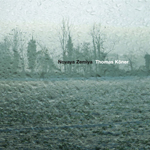|
|
 |
Dusted Reviews
Artist: Thomas Köner Album: Novaya Zemlya Label: Touch Review date: Aug. 15, 2012 |

|
|
|
 |
All our communication, external and internal, travels along intangible “roads” or “systems” that are made up of an odd collection of parts. These parts may be something external, like the internet, or internal, like a memory or an image. Some are ancient and some are modern, but they all carry messages back and forth between us and the world. Sound particularly evokes vivid associations aside from and including the musician’s intent. Often we aren’t conscious of the system and its role and therefore each system part can form both a liberation and a restriction. We find ourselves in a time when even gathering daily information — newspapers, message boards, emails — has become an ordeal, as we scramble for tastes of every pie our abundant access has made available. In the grab for cultural experience, the time spent with functions, institutions and settings in the infrastructure of culture has afforded us the appearance of a freedom whose credibility is seriously overdrawn. It takes a twist of perspective to breathe fresh life into any system and its parts.
It is in this domain that Thomas Köner performs his rather magical form of art. The throbbing heart at the pulse of Köner’s cathartic sound is an alternate encounter with the world through the mediation of a kind of auditory viewfinder, programmed in different ways by the abovementioned systems. In true minimalist style, this involves removals and absences, and a challenge to our experience of the ultimate system, Time.
Novaya Zemlya literally means “new land” and is the name of a cluster of remote islands in the Arctic Ocean in the north of Russia. From the outset, one is metaphysically thrown into the landscape as early sounds reflect an image of melting ice tumbling into a heated ocean. Initially the sounds are an exhortation on the dangers of global warming. Soon the silent spaces evoke feeling as well as landscape. It is easy to make a match between the depleted cold, polluted morass of the most remote place on earth and its corresponding vibration in our soul. Through the ghost of a melody, the mood slides from barren wasteland to dystopian anxiety. Later in the piece, Köner revisits the theme of time with haunting radio dialogue suggesting an older military presence on the islands. This sound still carries an ominous message despite its subterranean ambiguity.
This listening experience is more than distorted field recordings of a potential catastrophe. Köner gives us an opportunity to notice our bustling fluster of a life and reminds us that our many and varied systems of interaction with the world have material impact. We are brought to a remote part of the planet in an involved systematic intimacy. We are that remote part of the planet, it is inside us, we build and create it each day in the circulatory adherence to the circuitry revolving around our immediate interests. These systems are feeding back and we would do well to take heed.
By Lisa Thatcher
|







